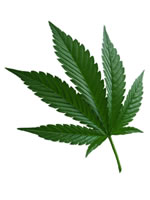Published: February 29, 2012

Image: iStockphoto
annabis-like substances that are produced by the body have both therapeutic and harmful properties, besides their well-known intoxicating effects, and the body’s cannabinoid system may be a target for new strategies in cancer treatment. This is what Sofia Gustafsson finds in the dissertation she recently defended at
Umeå University in Sweden.
Abuse of cannabis and preparations containing synthetic cannabis-like substances (cannabinoids) is on the rise all over Europe. At the same time, cannabis-based drugs have been approved for certain medical purposes, and in Sweden a compound was approved for symptom alleviation in multiple sclerosis (MS) just the other day. Intensive research is underway about whether new substances that affect the body’s own cannabinoids can be exploited for medical purposes, for instance, to relieve pain and to inhibit the growth of tumors. These are the reasons why Sofia Gustafsson studied the impact of cannabinoids on both the nervous system and tumor cells. [continue reading…]
Published: December 12, 2011
 For the first time, scientists have proven that cannabis harms the brain. But the same study challenges previously-held assumptions about use of the drug, showing that some brain irregularities predate drug use.
For the first time, scientists have proven that cannabis harms the brain. But the same study challenges previously-held assumptions about use of the drug, showing that some brain irregularities predate drug use.
Professor Dan Lubman, from Turning Point Alcohol and Drug Centre and Monash University, along with a team of researchers from Melbourne University have conducted a world-first study examining whether these brain abnormalities represent markers of vulnerability to cannabis use.
“Previous evidence has shown that long-term heavy cannabis use is associated with alterations in regional brain volumes,” Professor Lubman said.
“Although these changes are frequently attributed to the neurotoxic effects of cannabis, no studies have examined whether structural brain abnormalities are present before the onset of cannabis use until now.”
To fill this void in present studies, Professor Lubman and his team recruited participants from primary schools in Melbourne, Australia, as part of a larger study examining adolescent emotional development.
Of the 155 original participants who underwent structural magnetic resonance imaging at age 12, 121 completed a follow-up survey measuring substance use four years later. It was found that by age 16, 28 participants had commenced using cannabis.
“This is an important developmental period to examine, because although not all individuals who initiate cannabis use during this time will go on to use heavily, early cannabis use has been associated with a range of negative outcomes later in life,” Professor Lubman said. [continue reading…]
Published: October 11, 2011
 Young people who are genetically vulnerable to depression should be extra careful about using cannabis: smoking cannabis leads to an increased risk of developing depressive symptoms. This has emerged from research carried out by Roy Otten at the Behavioural Science Institute of Radboud University Nijmegen that is published in the online version of the scientific journal Addiction Biology. Two-thirds of the population have the gene variant that makes one sensitive to depression.
Young people who are genetically vulnerable to depression should be extra careful about using cannabis: smoking cannabis leads to an increased risk of developing depressive symptoms. This has emerged from research carried out by Roy Otten at the Behavioural Science Institute of Radboud University Nijmegen that is published in the online version of the scientific journal Addiction Biology. Two-thirds of the population have the gene variant that makes one sensitive to depression.
Many young people in the Netherlands use cannabis. Nearly 30% of 16-year-olds indicate that they have used cannabis on at least one occasion, and 12% that they have used it during the past month. Besides worse performances at school, the use of cannabis also increases the risk of developing schizophrenia and psychosis. Smoking hashish and weed were thought to increase the risk of depression but no conclusive evidence for this was available to date. Otten suspects that this is partly because his predecessors failed to consider the individual genetic vulnerability to depression. [continue reading…]
Published: October 8, 2011
 A new study that is published in the current issue of Psychotherapy and Psychosomatics addresses the problem of cannabis use in young people and addresses a very difficult target, psychotic patients.
A new study that is published in the current issue of Psychotherapy and Psychosomatics addresses the problem of cannabis use in young people and addresses a very difficult target, psychotic patients.
This study analyses the efficacy of a specific motivational intervention (MI) on young cannabis users suffering from psychosis. MI appears to be a useful active component to reduce cannabis use which should be integrated in routine clinical practice.
Cannabis use has a negative impact on psychosis. The aim of this study is to analyze the efficacy of a specific motivational intervention on young cannabis users suffering from psychosis. [continue reading…]


